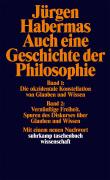Auch eine Geschichte der Philosophie [band I-II]

This second volume of Jürgen Habermas' monumental history of philosophy recounts the origin and decline of a metaphysical-religious image of the world so powerful as to guide European culture and society for centuries. The relationship between faith and knowledge reaches its first important synthesis in the time of Augustine, with the osmosis between Christianity and Neoplatonism, and culminates, in Christian Europe, with the scholastic philosophy of Thomas Aquinas. Duns Scotus, William of Ockham and Luther are decisive stages in the radical separation of faith and knowledge that opens the modern path and prepares the transition from ontology to the philosophy of the subject. In Habermas' story, the Middle Ages no longer appear as a "dark" millennial parenthesis between Greek civilization and the Renaissance, but as an era full of life of the human spirit, in which collective learning processes take place, marking forever the our history. Whether it is the idea of free will, the concept of causality or the problem of universals, Habermas' genealogy is extraordinary for its ability to convey to us the historically constructed sense of the intellectual coordinates that continue to direct our thinking today.